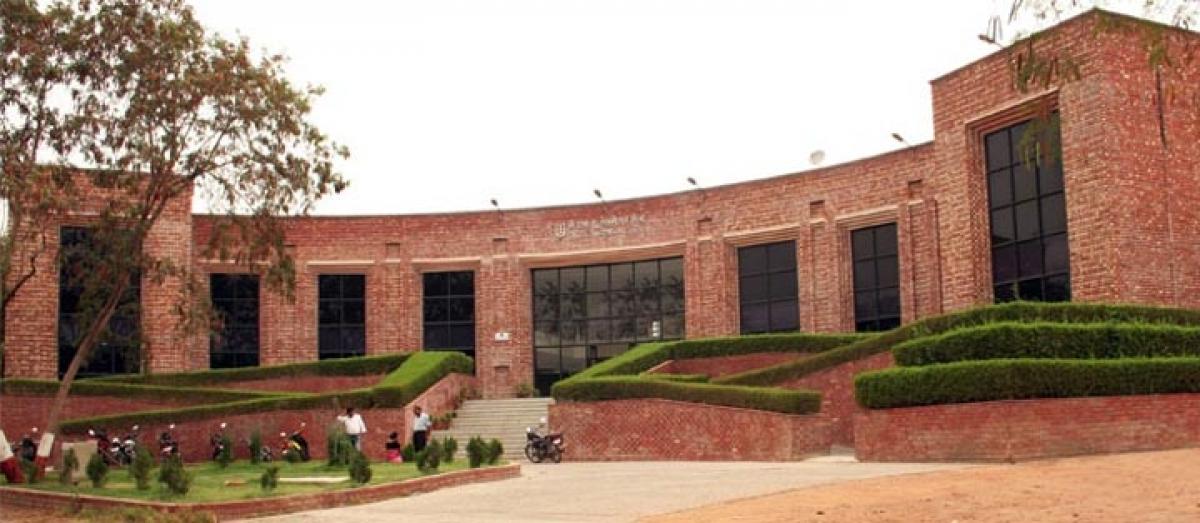Live
- UpStudy: The Smart Solution for Homework Hassles
- Actress Rithika and models inaugurate Sutraa Lifestyle Exhibition
- Loud campaign
- Faculty students celebrated english literature day in Government Degree College
- Huge fire accident.. Shops of street vendors burnt in the fire
- Pawan Kalyan promises to protect the coastal area from sea erosion
- EC Transfers Two Senior IPS Officers in AP ahead of Elections
- DMK analysis predicts victory for INDIA bloc in TN but concedes gains for BJP and NDA too
- India showcasing innovative technologies at World Energy Congress
- IPL 2024: Mitchell comes in for Ravindra as Lucknow opt to bowl first against Chennai
Just In

There is much talk about events happening in universities across the country.
There is much talk about events happening in universities across the country. The events at Jawaharlal Nehru University (JNU) and subsequent sedition charges have sparked off controversies in other institutions of higher learning, wherein outside forces are trying to curb the freedom of students and free flow of ideas. Earlier, the death of Rohith Vemula at Hyderabad Central University sparked a huge uproar, with the Opposition grabbing the opportunity to hit out and accuse the Government of being anti-Dalit.
It is indeed shameful that the turmoil in JNU has drawn international criticism from renowned personalities such as Noam Chomksy, the well-known social commentator, Judith Butler, gender theorist, Orhan Pamuk, Nobel laureate author, all of whom, in a statement, condemned ‘the culture of authoritarian menace that the present government in India has generated’ and that those in power are replicating the dark times of the oppressive colonial period and the Emergency.
In fact, Chomksy is reported to have asked the JNU VC ‘why the police was allowed to enter the University when it wasn’t legally required.” Sadly, at a recent meet of Vice Chancellors vital issues such as politicisation of universities and its students’ bodies were not discussed for reasons best known to the educationists.
However, during a lecture former UGC chairperson Sukhdeo Thorat stressed on policies that would enhance equity, non-discrimination and inclusiveness in higher education. What goes unanswered is how to tackle the party in power, whether at the Centre or in the States, which frantically try to thrust their politics on student bodies in Universities.
The quality of university education cannot improve if such politics as being witnessed at JNU, Hyderabad University, FTII etc enters the system.
The lofty ideals enunciated by India’s first prime minister, himself a statesman in his own right, is indeed very difficult to make this a reality unless the political system changes and is geared for the same.
Whether in Central or State universities, all if not most VCs are selected on the basis primarily if they find favour with the party in power. Academic considerations are rarely and not the main criterion. Many of the Third World countries, which are much smaller in size, have fared much better, the primary reason being there is virtually no or very little interference in the administration of institutes of higher learning.
While total non-interference of the State hierarchy may be a utopian idea, heads of academic bodies should be given a free hand in running these institutes. Most academicians agree the basic factor needed to improve performance and quality is to give more autonomy to these institutions and less interference, specially by political leaders.
Reiterating this in a recent article Prof. Suranjan Das, VC of Jadavpur University (also mired in controversy), stated that a university’s autonomy is sacrosanct though he observed that students have a moral responsibility to promote and preserve academic excellence.”

© 2024 Hyderabad Media House Limited/The Hans India. All rights reserved. Powered by hocalwire.com







